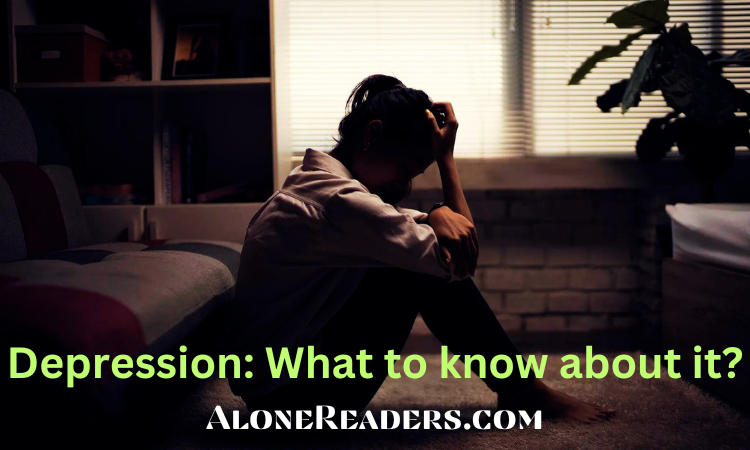
Chronic feelings of emptiness, sadness, or an inability to feel pleasure are known as depression, and they sometimes seem to occur for no apparent reason. The World Health Organization (WHO) claims that depression is the primary cause of disability in the entire world.
Over 121 million people suffer from depression worldwide. It can ruin a person's quality of life and affect their ability to work and develop relationships. At its worst, depression can result in suicide and accounts for 850,000 deaths annually.
Depression is a mood disorder that results in persistent feelings of sadness, emptiness, and lack of joy. It can also make it difficult to think, remember things, eat, and sleep.
It's common to feel depressed or cry about challenging life events, such as losing your job or being divorced. But depression is distinct from sadness in that it lasts virtually every day for at least two weeks and includes other symptoms than just sadness.
For numerous weeks, months, or even years, depression can last. It is a chronic condition that often improves before recurring for many people.
Depression is the most common mental disorder. It is affecting an estimated 300 million people worldwide and often affects women more frequently than males.
Because so many people choose not to seek medical attention for depressive symptoms and don't get a diagnosis, researchers think that these estimates are lower than the actual numbers.
Depression comes in a variety of types. The following are some of the most common types:
Major depression
An individual who has major depression is constantly depressed. They might stop being interested in things they formerly liked.
Persistent depressive disorder
Persistent depressive disorder, often known as dysthymia, is characterized by symptoms that continue for at least two years.
Major depressive episodes as well as less severe symptoms that may not fulfill the criteria for major depressive disorder may occur in a person with this illness.
Postpartum depression
Postnatal depression, often known as postpartum depression, is more serious.
This kind of depression can last for months or years, and there is not a single reason for it.
Major depressive disorder with seasonal pattern
Previously known as seasonal affective disorder (SAD), this type of depression typically happens in the winter and fall, when there is less daylight. Other seasonal patterns may occur more rarely.
People who live in nations with lengthy or harsh winters seem to be more prone to this illness.
Several psychological and physical symptoms of depression include:
In addition to these symptoms, depression can also result in irritability, restlessness, chronic pain, headaches, and digestive problems.
Anyone can experience depression, including both adults and children. In comparison to men and those assigned male at birth, women and those assigned female at birth are more prone to experience depression.
Depression is more likely to occur if you have certain risk factors. As an illustration, the following conditions are linked to higher rates of depression:
Neurodegenerative diseases.
The true causes of depression are not entirely understood by the medical community. There are numerous potential reasons, sometimes a number of things interact to generate symptoms.
The following factors are likely to come into play:
One of the most treatable mental health issues is depression. About 80% to 90% of depressed individuals who seek treatment eventually have a positive response.
Options for treatment include:
Psychotherapy:
A mental health professional and the patient talk during psychotherapy (talk therapy). Psychotherapy comes in a variety of forms, with cognitive behavioral treatment (CBT) being the most popular. Sometimes only a short course of therapy is required.
Medication:
The brain chemistry that causes depression can be altered with the help of prescription drugs referred to as antidepressants. Finding the right antidepressant for you may take some time because there are numerous varieties available. The negative effects of several antidepressants frequently get better with time.
Complementary medicine:
Treatments that you might receive in addition to conventional Western medicine are referred to as complementary medicine. Therapies like acupuncture, massage, hypnosis, and biofeedback can enhance the well-being of those with mild depression or persistent symptoms.
Brain stimulation therapy:
People who suffer from severe depression or depression associated with psychosis may benefit from brain stimulation therapy. Brain stimulation therapies include electroconvulsive therapy (ECT), transcranial magnetic stimulation (TMS), and vagus nerve stimulation (VNS).
Every aspect of a person's life can be impacted by the significant, persistent medical illness known as depression. If it leads to suicidal thoughts, it could be fatal.
Depression is a condition that cannot be changed by thinking. Depression is neither a personal failing nor a sign of fragility. It is treatable, and seeking assistance as soon as you can increases your chances of recovery.
Because depression can be challenging to cure, it is essential for a patient to speak with a doctor who has experience treating the condition and to be open to attempting a variety of treatments. When treatment and medicine are used together, the best results are obtained.